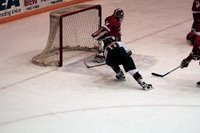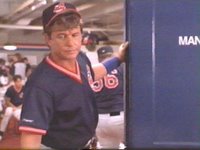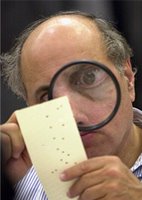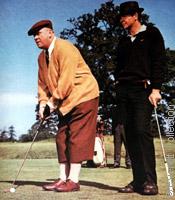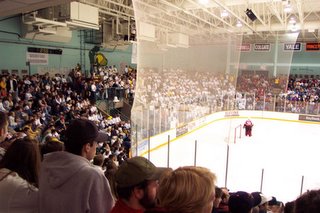Interview with Women's Hockey Coach, Rick Seeley

Clarkson Women’s Head Hockey Coach Rick Seeley was kind enough to give us some time after the team’s impressive victory over RPI. Coach Seeley, in his third year of coaching at Clarkson recently coached his 100th career win. He sets us straight on the Knights NCAA eligibility, and chats with us about the current status and future of the Golden Knights as they enter the homestretch of their third season at the Division I level.
Clarkson Hockey Fans (CHF): Nobody has any clue about what’s going on with the PWR and the team’s eligibility, Can you break it down for us, what’s the official word?
Coach Seeley: The Women’s Team should be eligible for NCAA play this year. There’s a misunderstanding about what was necessary at the time, of what needed to be filed by the school during the probationary process, and that didn’t get filed on time, so we were declared ineligible. We actually had to appeal to get a year back. The NCAA saw that there was no bad intention on our part, and saw that we were making every effort to make a successful effort at a D-I program, and so we got that year back.
CHF: When did the team actually find out about this, and how did they take it?
Coach Seeley: They actually found out about it the day the PWR came out, we had to get them together and tell them. The leadership of the team stood up and basically said, listen “we haven’t even won a conference playoff game yet, lets focus on that.”
CHF: You were coaching at D-III Manhattanville before coming to Clarkson, what’s the biggest difference between the D-I and D-III game?
Coach Seeley: Just head to head? Clearly, the skill level and the speed. I think to be successful at any level, women’s, men’s, NHL, Division III, takes just a commitment level, work ethic, attention to detail. I think the key is at any level is to find great people, good leaders, people who will work.
CHF: Where do you think this team needs to improve right now?
Coach Seeley: Generally, we need to score more goals. That wasn’t indicative today, but when we’re in tight ECAC contests, that’s where it really shows our inexperience. We have a strong defensive team, and that’s the core to take care of first, but now we have to do one of two things, either teach the current players how to be more productive, and that’s playing better away from the puck, or bringing in more offensively talented players and that’s getting easier each year with recruiting.
CHF: Is that something that looking at? Recruiting a big goal scorer? It looks like you’ve got a real balanced sheet right now, everyone is chipping in right now, but you don’t have that standout player putting in 35 goals in a year.
Coach Seeley: Yeah, we don’t have that in any class, but like you said we have enough chipping in, Ashley Shaidle scores pretty regularly, Brooke Beazer; Of the freshman: Marie-Jo Gaudet, Mich (Micheleen) Devine have the potential to become those goal-a-game type players. We’re still talking to a couple of recruits for next year that could definitely be those types. But like I said, each year we have more success with more blue chip kids interested. With each year our recruiting class has gotten stronger.
CHF: With no seniors scheduled to leave the team, what’s the recruiting situation looking like right now?
Coach Seeley: Every player on this team deserves to be on this team, they all work hard. Obviously they’re at different levels of skill. No one will be pushed out of this program. We don’t want to bring in anymore than four, we’d be happy with three. But there’s enough spots on the team where we can improve ourselves, we don’t want to bring in people with equal ability of a fourth liner, we want to bring someone in that’s going to press the top lines down a bit. Some people lose a bit of ice time, but they’re the ones not getting a lot of ice time now.
CHF: Are you looking in the direction of a forward? Defenseman?
Coach Seeley: We’ve signed one defenseman who we think is big time, Carlee Eusepi out of Toronto (Toronto Junior Aeros, 2-12-14, 28 GP). We're speaking to a forward from Quebec, great hands, great offensive tools, and we’re talking to one of the top forwards in Canada out of Ottawa.
CHF: Who’s been the biggest surprise on the team so far this season?
Coach Seeley: Our development has been pretty steady, one person who has exceeded is Jessica Cloutier, she came here and it’s was a big challenge for her, there were lots of questions, but she’s done everything it takes to be a solid hockey player.
 CHF: RPI is a team in very similar situation to what you were in three years ago. Do you think that your progression into D-1 has been the model for other new teams to follow? Do you welcome the comparisons and complements?
CHF: RPI is a team in very similar situation to what you were in three years ago. Do you think that your progression into D-1 has been the model for other new teams to follow? Do you welcome the comparisons and complements? Coach Seeley: I think so. Our first year people said we did it the right way, we didn’t jump right into a conference, we did one third Divison III games, two thirds against Division I teams, against the lower half of Divison I just to get our feet wet. I think they’re pretty much on the same track as we were, we’ll see where we end up. I don’t think there’s been many teams have succeeded as quickly as we have. That’s a testament to the players as well.
Obviously I’m proud, but I’m more proud like a parent would be, because I’ve seen the development of these kids. They came in as freshman with no upperclassmen to look to, there’s no guidance outside of the coaches, and they made this program evolve into what it is and the leadership on this team is far and away the best I’ve ever been associated with, men’s or women’s. I think that’s the key.
I’m pretty tough starting, I think that’s why I’ve had success in both places, I don’t really let anything go, and I think that’s hard initially for them, but they’re juniors now, and now that’s the norm for them.
CHF: What are the options for your players after their years at Clarkson are over? Are there any potential Olympic candidates in this group?
Coach Seeley: Every year our recruiting class gets a little stronger, so there’s more potential for that. There is not a lot of options for women. There are the national programs, the U-22 programs, which are the feeder programs for them, and a few pro leagues, very limited in Europe. So the difference between men and women a lot of the time, is when they’re going away to a university, they’re not thinking hockey necessarily after, when most men are still dreaming about that. I think that’s why you get a lot more of the stronger women players going to the Ivy schools because all they’re focused on is their education. But we’ll have some that have the potential, we already have some that are talking to national programs.
CHF: How do you prepare your team’s penalty kill unit, considering you don’t give up any penalties?
Coach Seeley: Well basically, in our conference anyway, there’s DVD exchange, so we get to scout every teams power play, spending some time in each practice learning the other teams tendencies. That’s another compliment to the players, they play hard, and they play a way a lot of times that evokes penalties. I think we were three-for-three on the power play, which is unusual, but nice.
CHF: Is it true you consider each game a loss, unless you score more than the other team shoots?
Coach Seeley: Well our team really does pride itself on defensive play. I think our watermark is the ten shot mark. We dominated Brown 28-6, but we lost that one. We showed everything we had there, we play pretty good defense, but we don’t score a lot. But yeah, that’s happened a couple of times (scoring more than their opponent shoots.)
CHF: Tim Horton’s or Dunkin’ Donuts?
Coach Seeley: I’ve never eaten at either, but I’d go with Tim Horton’s. Do you know what Tim Horton’s last words were? “There’s always tomorrow.” And then he died in a car crash the next day.
CHF: What’s your favorite hockey cliché?
Coach Seeley: I’d probably go with one shift at a time.

